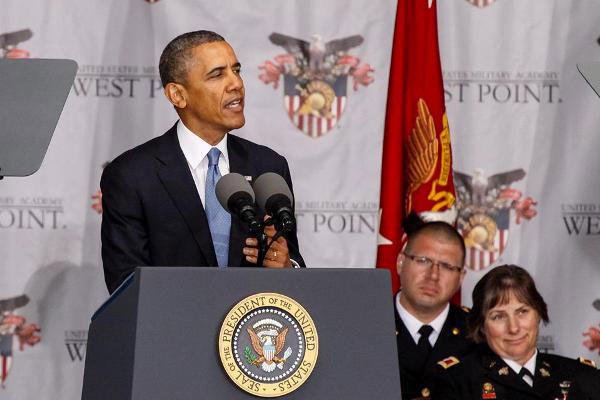President Obama set a new course Wednesday for American foreign policy with an associated strategy for the use of force endorsed by his top military commanders.
"Our military has no peer," Obama said in what was billed as a major foreign policy address at West Point. "But to say that we have an interest in pursuing peace and freedom beyond our borders is not to say that every problem has a military solution."
"Here's my bottom line: America must always lead on the world stage. If we don't, no one else will," Obama said. "The military that you have joined is, and always will be, the backbone of that leadership."
However, Obama said there must be limits to that leadership and the military action to support it.
"U.S. military action cannot be the only -- or even primary -- component of our leadership in every instance," Obama said. "Just because we have the best hammer does not mean that every problem is a nail."
The president was short on the specifics of how his policy would be carried out on limiting the direct use of force by the U.S. in favor of collective action with partner nations.
He proposed setting up a $5 billion Counter-Terrorism Partnerships Fund to train and assist partner countries in combating Al Qaeda and its offshoots. The proposal will need the approval of Congress.
Obama also referred to the ongoing tragedy of the Syrian civil war in which more than 150,000 have been killed and millions have fled the country.
The president renewed his commitment to keeping U.S. troops out of Syria.
"As frustrating as it is, there are no easy answers - no military solution that can eliminate the terrible suffering anytime soon," Obama said.
There was speculation before the speech that Obama would announce the dispatch of U.S. troops to Jordan or Qatar to train and arm rebel fighters from the moderate Syrian opposition. However, a senior White House official said after the speech that the plan to train and arm was still under review and would be discussed with Congress.
"The U.S. military would need certain authorities and resources" for the mission that required the approval of Congress, the White House official said on background.
Much of Obama's address followed the broad outlines of his 2012 strategic guidance that advocated a smaller and more agile military. In the future, the U.S. would avoid lengthy land wars such as Iraq and Afghanistan and de-emphasize the national-building counter-insurgency doctrine.
The new policy announced at West Point was also in line with the positions already staked out by top commanders.
Obama spoke a day after following the recommendations of Marine Gen. Joseph Dunford, the U.S. and allied commander in Afghanistan, to leave a follow-on force of 9,800 troops in Afghanistan after the withdrawal of combat forces at the end of this year.
The thrust of the new policy could already be seen in the efforts of Gen. David Rodriguez, head of the Africa Command, to give a low profile to U.S. troops while pursuing training, advisory and partnering roles to counter threats in in Mali, the Central African Republic, Nigeria, Somalia and Libya.
Obama critics have accused him of a "lead from behind" strategy that has left the U.S. rudderless against emerging threats in Nigeria, Ukraine and the Middle East, and against the aggressive territorial claims by China and Russia.
Even before Obama made the speech, Sens. John McCain, R-Ariz., Lindsey Graham, R-S.C., and Kelly Ayotte, R-N.H., issued a joint statement saying that Obama's remarks will only "fuel the growing perception worldwide that America is unreliable, distracted and unwilling to lead."
In his speech, Obama spoke directly to the graduating class of 1,046 seniors at the U.S. Military Academy on what his efforts to end the wars in Iraq and Afghanistan meant to them.
"You are the first class to graduate since 9/11 who may not be sent into combat in Iraq or Afghanistan," Obama said to cheers and applause from the cadets.
With 30 months left in office, Obama said he was seeking to chart a foreign policy middle course between the "realists" and the "interventionists."
The realists back the use of force only against direct threats to the U.S. and its national interests, Obama said, while the interventionists suggest that "America's willingness to apply force around the world is the ultimate safeguard against chaos."
"Each side can point to history to support its claims," Obama said, "but I believe neither view fully speaks to the demands of this moment."
Under his administration, "the United States will use military force, unilaterally if necessary, when our core interests demand it," Obama said.
"On the other hand, when issues of global concern do not pose a direct threat to the United States," and "when crises arise that stir our conscience or push the world in a more dangerous direction but do not directly threaten us -- then the threshold for military action must be higher," Obama said.
-- Richard Sisk can be reached at Richard.Sisk@monster.com.






























